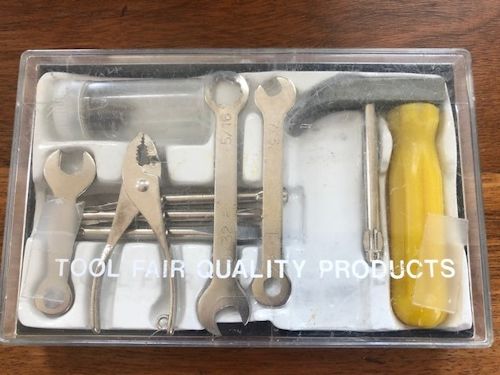She received a toolkit in seminary. Now the Rev. Dr. Jennifer Browne assembles a toolkit for use by pastors, church members, and leaders experiencing burnout.
JENNIFER BROWNE
Director of Clergy Excellence

I spent my third year of seminary living and working at Our Savior’s Atonement Lutheran Church in the Washington Heights neighborhood of New York City. There were four of us there that year; we did everything from clean the toilets to teaching Bible Study. On our final Sunday as interns, we were each presented with a Pastor’s Supply Bag from the church pastor. I remember only one of the items that the bag contained, and I still have it – a mini-tool kit, complete with a tiny hammer, pliers, socket wrench, screwdriver, and even tinier nails and screws.
The toolkit was more symbolic than anything else, although I have used most of the nails and screws and have occasionally needed the wee pliers. Pastor Barbara’s purpose was not so much practical as pedagogical: being a pastor requires more than knowledge of the Bible and theology. You’re going to have to know how to read financial reports, run the sound system, write a press release, sew a banner, and … repair the boiler.
These days, pastors also have to know how to use video recording equipment, send participants into Zoom break-out rooms, interpret government regulations, and make judgment calls that affect their congregants’ safety and well-being.
For so many church leaders – both clergy and lay – this new set of tasks and responsibilities is unwelcome. “I didn’t sign up for this,” is a refrain I hear often. “I’m a people-person, not a techie.” The result of this abrupt switch to new, unfamiliar skills, added to the heightened anxiety that all of us are experiencing, is an increase in clergy burnout. The November 18 issue of The Christian Century has those words plastered across its cover in fire-red letters. The Barna Group captioned one of their State of the Church webcasts as “Many Pastors are Tired, Overwhelmed and Lonely” – and that was in May. If you google “clergy burnout,” you’ll come up with plenty of pre-pandemic results. Now in November, the topic is a mainstay of my reading and conversations.
Here’s what I’d like to put in your Supply Bag, whether or not you’re a pastor, a church leader, a church member, or none of those –

 Know Yourself. The healthiest, most resilient leaders see and talk about themselves honestly. They know their own strengths and weaknesses. They’re comfortable in their own skin, confident about who they are, and are unafraid to admit to their own shadow sides. Self-knowledge spills over into accepting, non-judgmental relationships; there’s no need for defensiveness if you’re the expert on your own flaws. Self-knowledge results from one’s relationship with God, which is inextricable from one’s relationship with others. So …
Know Yourself. The healthiest, most resilient leaders see and talk about themselves honestly. They know their own strengths and weaknesses. They’re comfortable in their own skin, confident about who they are, and are unafraid to admit to their own shadow sides. Self-knowledge spills over into accepting, non-judgmental relationships; there’s no need for defensiveness if you’re the expert on your own flaws. Self-knowledge results from one’s relationship with God, which is inextricable from one’s relationship with others. So …
 Stay Connected. Stay connected to the Holy One through spiritual practices. Stay connected to your family of origin in calm, non-reactive ways. Stay connected to your loved ones by setting boundaries on your work hours and cultivating the part of you that is not a pastor or church leader. Stay connected to your trusted and trustworthy friends who will tell you when you’re veering off course. And when they do …
Stay Connected. Stay connected to the Holy One through spiritual practices. Stay connected to your family of origin in calm, non-reactive ways. Stay connected to your loved ones by setting boundaries on your work hours and cultivating the part of you that is not a pastor or church leader. Stay connected to your trusted and trustworthy friends who will tell you when you’re veering off course. And when they do …
 Ask for Help. A recent letter from Bishop Bard and other Conference leaders, including myself, sent to all Michigan Conference clergy and lay leadership, delineates a long list of available health-promoting resources and opportunities. The letter was specifically about resources and opportunities available to clergy, but it’s true for everyone: asking for help is a sign of strength, not weakness. This includes asking for professional help, like seeing a therapist or engaging a coach. Still, it also includes smaller requests, like arranging for a sharing of duties (if you’re running the meeting, someone else can take notes or manage the screen-sharing) or asking that lay leaders communicate with church members about the importance of time off.
Ask for Help. A recent letter from Bishop Bard and other Conference leaders, including myself, sent to all Michigan Conference clergy and lay leadership, delineates a long list of available health-promoting resources and opportunities. The letter was specifically about resources and opportunities available to clergy, but it’s true for everyone: asking for help is a sign of strength, not weakness. This includes asking for professional help, like seeing a therapist or engaging a coach. Still, it also includes smaller requests, like arranging for a sharing of duties (if you’re running the meeting, someone else can take notes or manage the screen-sharing) or asking that lay leaders communicate with church members about the importance of time off.
I wish that preventing burnout was a technical fix, like fixing the boiler. But it’s an adaptive problem, which means there’s no instruction manual. This toolkit requires each user to diagnose the situation themselves and to initiate a plan that will move them towards greater health and vitality. The tools are only as effective as the person who uses them!
Our Thanksgiving celebration will be smaller than usual this year, and I imagine that the same is true for many of you. But I will have just as many – perhaps more – things to be grateful for. High on that list is all of you who serve Christ through our churches and ministries with faith, dedication, skill, and wisdom.
May you know yourself and how gifted you are.
May you always feel the connection to the One and the ones who love you.
May you recognize when you need help and give yourself permission to ask for it.
Last Updated on September 20, 2022

